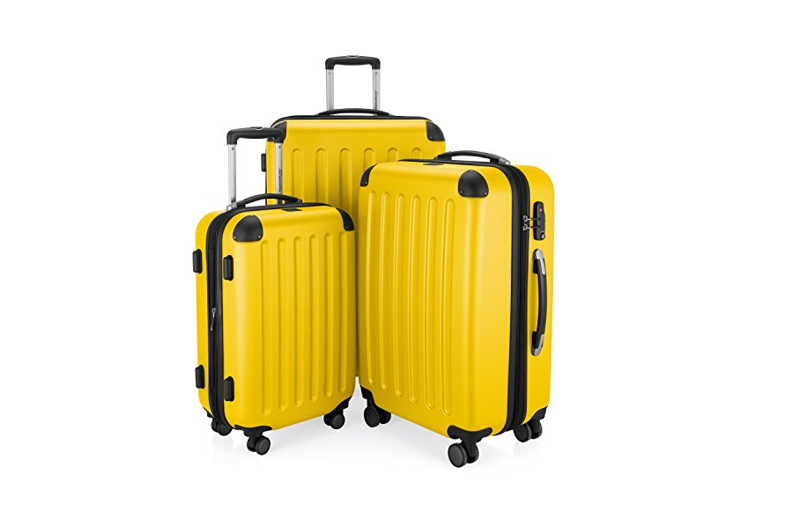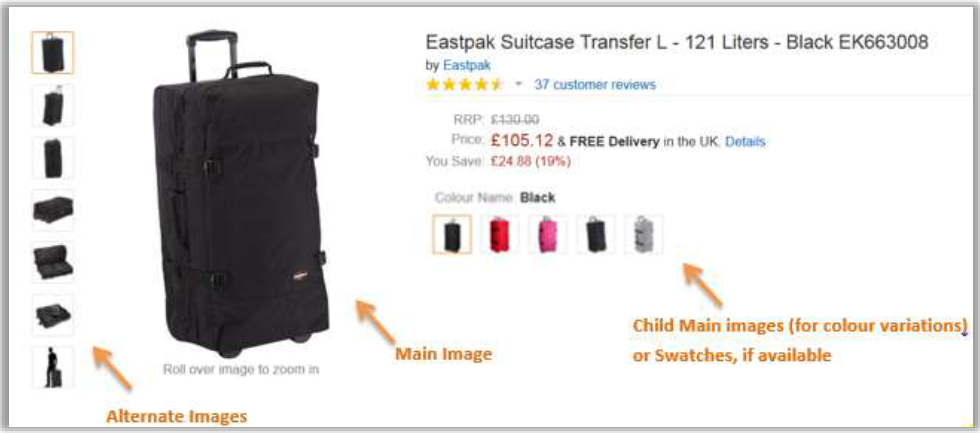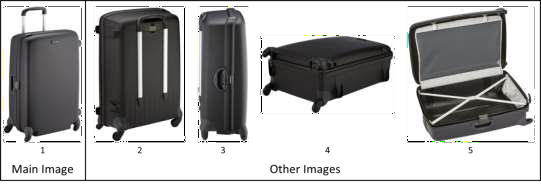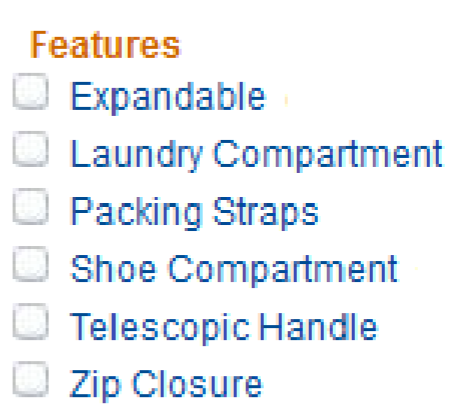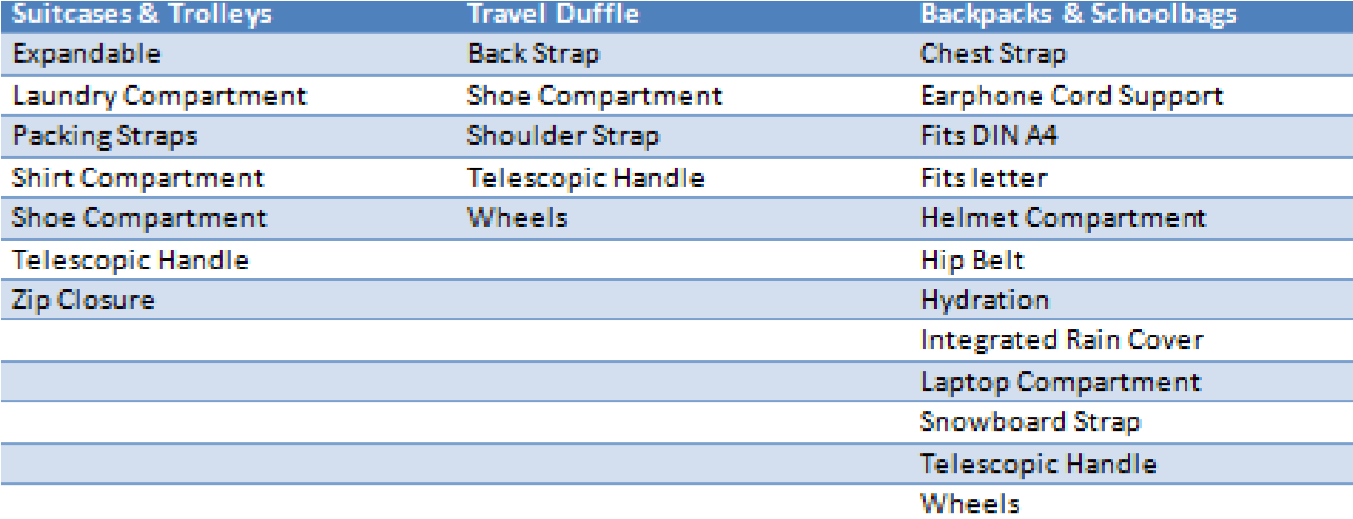
Your success on Amazon.co.uk largely depends on the quality of your product pages. Listings in a consistent format with accurate and detailed product information will drive traffic to your pages and can favourably influence the customer’s purchasing decision. Please note that non-compliance with Amazon requirements may result in your products being hidden (suppressed) from search and browse and your selling privileges revoked for this category. For further information, please refer to the respective section in the Style Guide.
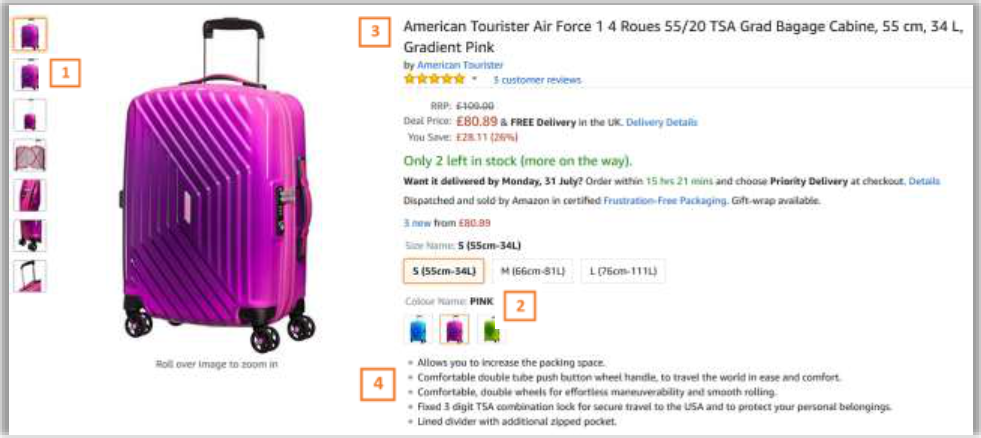
The above Suitcase is an example of what a compliant product listing on Amazon should look like. In the section below, you will find the basic requirements for setting up similar compliant listings for your products.
 Images must be at least 1600px on the longest side to enable zoom, be on a pure white background, show only the product for sale, show a front product view, have an aspect ratio close to 3:4 (Width: Height), occupy at least 85% of the image area and show a real representation of the product (no sketches) without extra text or graphics, product must be shot flat. Each colour variation of the product needs an image. Images need to be saved in .jpg, .png, .tif or .gif. For more information, please see pages 3-4 and 12 onwards of the Luggage style guide.
Images must be at least 1600px on the longest side to enable zoom, be on a pure white background, show only the product for sale, show a front product view, have an aspect ratio close to 3:4 (Width: Height), occupy at least 85% of the image area and show a real representation of the product (no sketches) without extra text or graphics, product must be shot flat. Each colour variation of the product needs an image. Images need to be saved in .jpg, .png, .tif or .gif. For more information, please see pages 3-4 and 12 onwards of the Luggage style guide.
 All variations of a style of product must be placed in one listing under a parent product. In the above example, we have three sizes and three colours. Customer can easily see and select all the sizes and colours available without having to change the page. As each customer visit to a variation will be counted under the parent product detail page, this will increase your chances to sell a product (no. of detail page views is one of the criteria used to determine what appears at the top of the search results). For more information, please see pages 5-6 of the Luggage style guide.
All variations of a style of product must be placed in one listing under a parent product. In the above example, we have three sizes and three colours. Customer can easily see and select all the sizes and colours available without having to change the page. As each customer visit to a variation will be counted under the parent product detail page, this will increase your chances to sell a product (no. of detail page views is one of the criteria used to determine what appears at the top of the search results). For more information, please see pages 5-6 of the Luggage style guide.
![]() Good product titles build customer trust in you as a seller. The format for titles must be as follows:
Good product titles build customer trust in you as a seller. The format for titles must be as follows:
Suitcase and Travel Bags:[brand_name] + [style_name] + [model_name] + [item_length] + [item_dimensions_unit_of_measure]+[volume_capacity_name]+ [volume_capacity_name_unit_of_measure]+ [number_of_wheels] + “wheels” + [color_name] + [lock_type]
Luggage Sets:[brand_name] + [style_name] + [model_name] + [number_of_items] + “pcs”+ [color_name]
Travel Accessories: [brand_name] + [style_name] + [model_name] + [color_name]
Others:[brand_name] + [style_name] + [model_name] + [volume_capacity_name] +[volume_capacity_name_unit_of_measure] + [color_name]
There is a length limit that will suppress products with titles longer than 150 characters. Examples of compliant titles:
Samsonite Suitcase Meteor 75 Centimeters 94 Liters 4 Wheels Midnight Blue Number Lock, Travelite Luggage Set Meteor 3 pcs Red, GoTravel Travel Pillow Ultimate Black, Berghaus Trekking Backpack Twentyfourseven Plus 20 Liters Black.
For more information, please see pages 6-8 of the Luggage style guide.
 Bullet Points and Descriptions help customers to imagine the experience of owning or handling the product. The bullet point section shown in the image above will be the first part of written information a customer will see without the use of ‘scrolling’. Make sure to include all relevant information about the product. Product descriptions (not shown in the above example) are situated further down the listing page. To create a well-written product description, put yourself in your customers’ shoes: what would they want to feel, touch and ask? Incorporate information about the feel, usage and benefits of your product to fire the customer’s imagination. For more information, please see pages 8-11 of the Luggage style guide.
Bullet Points and Descriptions help customers to imagine the experience of owning or handling the product. The bullet point section shown in the image above will be the first part of written information a customer will see without the use of ‘scrolling’. Make sure to include all relevant information about the product. Product descriptions (not shown in the above example) are situated further down the listing page. To create a well-written product description, put yourself in your customers’ shoes: what would they want to feel, touch and ask? Incorporate information about the feel, usage and benefits of your product to fire the customer’s imagination. For more information, please see pages 8-11 of the Luggage style guide.
This guide aims to help you to create your catalogue easily and maximise your sales.
Your success on Amazon.co.uk largely depends on the quality of your product pages. Listings in a consistent format with accurate and detailed product information will drive traffic to your pages and can favourably influence the customer’s purchasing decision.
How you present your product information on our site is something we take very seriously for the benefit of customers and sellers on Amazon. Please read the guidelines below to find out how we expect sellers to list titles and display images. Failure to comply with these rules may result in your Luggage listings being removed and your selling privileges revoked for this category.
A) Images
Good images communicate selling points and features of your product, inform and interest customers, and reinforce your brand.
In an online store, the product image is one of your most valuable marketing tools. Listings with low-quality or few images suffer poor conversion rates and over time will appear less and less frequently in search rankings. The best customer experience is a store that is visually clean and consistent, so we require all sellers to commit to and maintain the standards described in this guide.
Important: Listings may be suppressed if they do not meet all required imaging standards. These listings will continue to be visible in your Seller Central account and accessible from the Suppressed Listings view in Manage Inventory where you can upload compliant images and information.
We recommend you to regularly check your Listing Quality and Suppressed Listing Report to identify detected by Amazon opportunities to improve image quality of your listings.
Please note that you may only use images for which you own corresponding copyright.
- Different types of imagesAmazon.co.uk can display several images for each product in the catalogue. While only main images are required for all parent ASINs and all child ASINs (every size in every colour), customers can make more informed purchasing decisions if you upload several high-resolution product images. Image files must be JPG, PNG, GIF or TIFF format (JPG is preferred). You can use four types of images to illustrate your products:

The parent ASIN’s MAIN image:Only one main image is used per parent listing. You must supply a parent main image.
The child ASIN’s MAIN image:Each child ASIN (corresponding to one SKU) must have a MAIN image that shows only that distinct colour option, and only one view of that item. You must supply a child main image for every colour and size option that you sell. The Main image is extremely important as it is shown on the results search page.
Alternate images:These show different views of the product to help clarify the use and details, e.g. from different angles. You can supply up to eight alternate images for each parent or child SKU. We recommend you to use the following alternate images for Luggage:
 Swatches:These may be used for close-up views of patterns or fabrics. You can supply one swatch per child SKU. Swatches display on the product detail page next to the name of the colour. With no swatch image, the child main image will be displayed instead.
Swatches:These may be used for close-up views of patterns or fabrics. You can supply one swatch per child SKU. Swatches display on the product detail page next to the name of the colour. With no swatch image, the child main image will be displayed instead. - Requirements for images
- Required
for MAIN
images:
- Every item must have a MAIN image for the parent ASIN as well as for each child ASIN (Colour / Size Variation).
- MAIN image must be on a pure white background (Hex #FFFFFF or RGB 255-255-255).
- MAIN image for Luggage must be shot flat.
- MAIN image must show only ONE product view, this must be a FRONT view.
- MAIN image must show only the product for sale (without extra accessories).
- MAIN image must show the entire product (no product parts could be clipped).
- MAIN image must have an aspect ratio close to 3:4 (Width:Height), and the product must occupy at least 85% of the image area in its longest dimension
for ALL
images:
- Images must be high resolution professional photos with 1,600 pixels or larger in either height or width to activate the zoom feature.
- The colour in the image must match the product for sale.
- Preferred
for ALL
images:
- Each parent and Child ASIN should have alternate images to show different product angles.
- Prohibited
for MAIN
images:
- Listings without MAIN images or with image laceholders such as “temporary image” or” no image available” are prohibited.
- MAIN images must not have a non-pure white or landscape background (shadows extending past side or top of frame are also prohibited).
- MAIN images must be a true photograph, not a sketch, drawing or graphical representation.
- MAIN images must not have any borders, logos, watermarks, text, colour blocks, inset images or other graphics.
- MAIN images must not contain multiple product views or multiple colourways/sizes except if these are sold together as a multi-pack (which must be mentioned in title and the pack must have its own specific manufacturer barcode).
- MAIN images must not be on a visible mannequin, hanger or holder.
- MAIN images must not be shot with a human model.
- MAIN images must not show any packaging, boxes, tags, certificates or brochures.
- MAIN images must not show products with some parts cropped or folded products.
- MAIN images must not show back, side or top product view.
- MAIN images must not be in black & white.
- MAIN images must not contain items or accessories that are not part of the product listing; only include exactly what the customers are buying.
for ALL images:
- Images must not be blurry, pixelated or with jagged edges.
- Images must not have low resolution or size less than 1,600 pixels.
Please refer to the appendix to see examples of compliant MAIN images.
B) EAN
EAN (European Article Number or now the International Article Number) is a unique 13 digit code given to individual articles and is used to identify the product.Amazon expects each seller to have EANs for their products, which should be provided by the manufacturer.
Important: Listings with missing or wrong EANs (external_product_ID) will be suppressed if those listings are for brands with known EANs. These listings will continue to be visible and accessible in your seller central account from the Suppressed Listings view in Manage Inventory where you can upload the appropriate images and information.
If you are the manufacturer of the product which includes manufacturer of customised or hand-made products, private label brand owners or producer of branded white-label products, you must have GTIN or Manufacturer Codes. If you are the manufacturer and still don’t have bar codes, you will need to apply for the Amazon Brand Registry Program. Brands registered in this program are assigned a Global Catalogue Identifier (GCID), which can be used as a substitute for Manufacturer Codes or GTINs when you list a new product on Amazon. If the products you sell do not qualify for the Amazon Brand Registry, they might still be eligible for an EAN exemption. For more information, log on to Seller Central and search for the keywords “Brand Registry” or use this link.
For products already selling on Amazon.co.uk, please make sure to list against an existing ASIN. Do not create an existing product with a new barcode as this will duplicate the listing on Amazon. Any duplicates will eventually be removed to ensure we keep the site clean for the best customer experience.
C) Variations
We call the different size and colours for the same product “variations”. Variations allow customers to find alternative desired colours or sizes for a product on one detail page.
To create a variation, you must create a product called a “parent” without any colour or size that links to all the “children” products, i.e. all the different colour/size combinations of the product available. All variations related to the same reference must be added to the same product page.
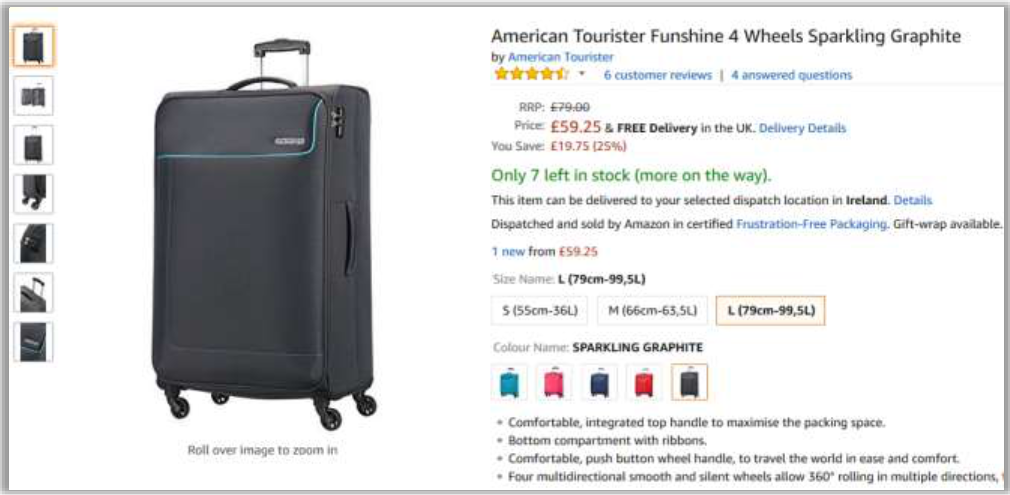
In the above example the parent product is a suitcase with no size or colour, and the variations are all the sizes and colours available for this suitcase (three sizes and five colours). All sizes and colours have been created on the same product page using variations. It is important to link all the variations of the same “parent” product for two reasons:
- The customer can easily see all the sizes and colours available without having to change page. A more fluid navigation will lead more often to a purchase as it is easier to see the different choices.
- Each customer visit to one of the “children” pages will be counted under the “parent” item. This will ultimately increase your chances to sell a product as the number of views is one of the criteria used to determine what appears at the top of search results.
Variation creation rules
|
|
· |
|
for Child ASINs |
|
Important: Please note that non-compliance of the variation principle may lead to a suppression of your ASINs.
NOTE: If you want to create a multi-piece luggage set, you should enter the details of the largest piece of luggage when filling in attribute details such as size and weight. Details for the additional items in the set, such as size, volume and weight of the smaller suitcases, beauty cases, etc., should be listed in the product description.
D) Colours
The product colour is one of the key information customer will use to make a buying decision and one of the ways by which customers will judge your quality and professionalism as a seller.
To keep colours concise and informative, make sure you are following the below guidelines for color_name attribute:
|
|
Examples:
|
| · Don’ts: |
|
Examples:
|
E) Titles
Good product titles build customer trust in you as a seller.
The product title is the first impression customers will have of your product, but it is also one of the ways by which customers will judge your quality and professionalism as a seller. Keep titles concise, informative and accurate and make sure you are following the syntax Amazon requires. ASINs with non-compliant titles may be suppressed from the website. If you follow the instructions, you will achieve the optimal “discoverability” in search queries and increase customer satisfaction.
Remember that on Amazon each unique product has just one product detail page, even if more than one seller has an offer against that unique product. Therefore, product titles should never contain information that is specific to just one seller, even if that seller has initially created the listing. Failure to comply with the below title requirements may result in the removal of your Luggage listings and your Luggage selling privileges being revoked.
1. Titles format
We have defined four standard title conventions. The title conventions are based on specific attribute values from your completed inventory file. Please follow the order of attributes as shown below when creating titles for these product types:
Suitcase and Travel Bags:[brand_name] + [style_name] + [model_name] + [item_length] + [item_dimensions_unit_of_measure] +
[volume_capacity_name] + [volume_capacity_name_unit_of_measure] + [number_of_wheels] + “wheels” + [color_name] + [lock_type]
Example: Samsonite Suitcase Meteor 75 Centimeters 94 Liters 4 Wheels Midnight Blue Number Lock
Luggage Sets:[brand_name] + [style_name] + [model_name] + [number_of_items] + “pcs”+ [color_name] Example: Travelite Luggage Set Meteor 3 pcs Red
Travel Accessories:[brand_name] + [style_name] + [model_name] + [color_name]
Example:Go Travel Travel Pillow Ultimate Black
All others, for example School Bags, Backpacks & Messenger Bags:[brand_name] + [style_name] + [model_name] + [volume_capacity_name] + [volume_capacity_name_unit_of_measure] + [color_name]
Example:Berghaus Trekking Backpack Twentyfourseven Plus 20 Liters Black
| Attribute | Definition | Restrictions | Value examples |
| [brand_name] | Brand or manufacturer of the product. | An alphanumeric string. 1 character minimum in length and 50 characters maximum in length. Do not use “unknown”, don’t put “Ltd.”. | Samsonite |
| [style_name] | Style name that best fits for the product. | Check the category specific Inventory file for list of valid values. | Suitcase |
| [model_name] | Model name as described by the manufacturer. This field can serve for the further description of the product (one or two words that best highlight the most important feature of your product). | A free text field up to a maximum of 50 characters in length. Do not add numbers since it does not add value for customers. | Meteor |
| [item_length]
|
Length of the product. | A number with up to 10 digits to the left of the decimal point and 2 digits to the right of the decimal point. Do not use commas. | 55
|
| [item_dimensions_unit_o
f_measure] |
Unit of measure which is used to describe the product dimensions. | Check the category specific Inventory file for list of valid values. | Centimeters |
| [volume_capacity_name] | Volume of the bag or suitcase in liters. | A number with up to 10 digits to the left of the decimal point and 2 digits to the right of the decimal point. Do not use commas. | 19
|
| [volume_capacity_name_
unit_of_measure] |
Volume Capacity Name Unit of Measure. | Select from the values: cup, gallon, liter, ounce, pint, quart. | liter |
| [number_of_wheels] | Number of wheels on luggage. | A whole number. | 4 |
| [lock_type] | Type of lock that the product includes. | Check the category specific Inventory file for list of valid values. | Number Lock |
F) Increasing discoverability
Products created with accurate and complete data will be found more easily by the customer and will therefore be sold more often.
Customers can search for and find products in one of the two ways: search – either within Amazon’s own site or on external search engines such as Google; or browse – navigate through the website. Most customers use a combination of both search and browse. It is therefore very important to ensure that your products are optimised for search and correctly categorised in browse, and have the right attributes (product data) to help customers filter the results
Basic rules to increase visibility:
- Always assign the most detailed browse node available in the Browse Tree Guide to ensure discoverability of your products in search and browse. Use the browse node ID labelled in black in the Browse Tree Guide rather than a light grey root node which only serves navigation purposes.
- A product description should be used instead of a selling pitch as it helps to increase sales and reduces the rate of product returns: use simple language based on the official information provided by the manufacturer. This description is part of the information referenced in the website algorithm.
- Search keywords make your products appear during free search.
1. Browse nodeThe browse node allows the product to be classified in the Amazon catalogue. It is comparable to a department in a supermarket.
Each department has a node number that you can find in the Browse Tree Guide. If you do not assign a node number to your product, the product will not be found on the website.
|
|
|
|
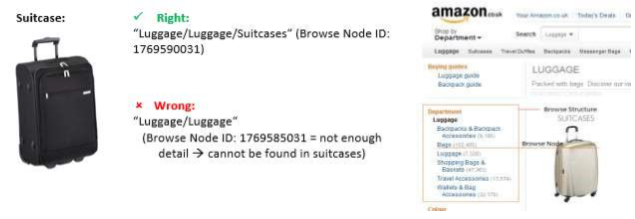
2. Product-specific attributes
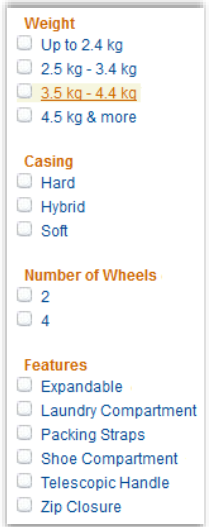
To search for a product, customers can use either the search bar or the refinements (filters) available in the left navigation bar. For each filter, there is an attribute field in the inventory file template. For most attributes, you can find predefined valid values in the Luggage Inventory File that you can choose from for your product. Other fields can be filled with free text information. If you do not fill in the fields, your products will not appear in the results when the customer selects one of these criteria and you will miss the opportunity to increase your sales. We recommend that you use these attributes as precisely and completely as possible in order to create customer trust and to avoid product returns.
Refinement information also appears as details on the product detail pages, which increases the chances of your product being found via internal or external search engines. From the product specification table, the customer is able to identify important attributes in a single table. This table is located below the product picture and can be used by the customer to compare different products easily.
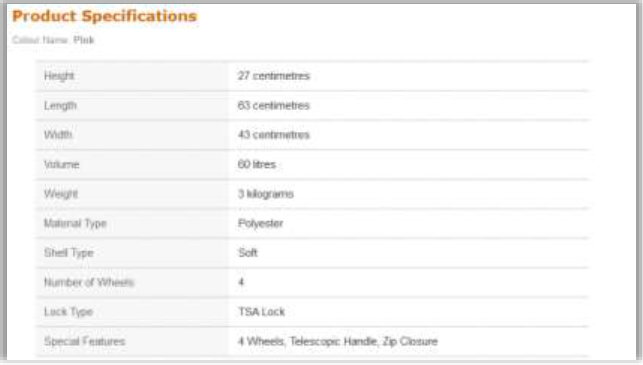
Main filters used for Luggage products
We recommend that you provide as much information as possible and regularly check Seller Central for the latest version of the Luggage Inventory File template because the refinements and valid values change periodically. You can download the file to update your catalogue with the new valid values, especially for the following attributes:
- Brand_name – it is important that you use the official spelling of the brand; do not enter the merchant’s company name in the “brand” field (if your product does not have any brand, please complete the manufacturer field instead) Style_name
- Model_name
- Color_name
- Color_map
- Model_number
Important: Please remember that some refinements are legal requirements, such as the rules on textile labelling. While filling the inventory file template, provide all the information marked as “Required” in the Data Definitions tab. If you upload products with “Required” attributes in blank, it may lead to a suppression of your ASINs.
Suitcase Sizes
To facilitate customers looking for a specific size of suitcase outside the conventional dimensions (height, length, width), you should also classify each item into one of three category sizes S, M & L.


Special Features
This attribute contains an extensive list of possible product-specific characteristics. The special properties in the following table can be displayed as a filter as well as under the product detail page.
|
Special Characters as filer options:
|
Special Features allocation by Product Type
|
3. Bullet points
Bullet point descriptions are keywords or short sentences that summarise your product’s key features. A customer should be able to understand the key features and characteristics and may then decide to read the product description for more detail. The bullet points are displayed on the product detail page in the Technical Details section, above the product description, but also feed into Amazon search and external search results. They help customers evaluate a product, so any information not directly relevant to the specific product can detract from a customer’s purchase decision.
|
|
|
|
Do not feel obliged to fill in all fields – 3 good bullets are better than 5 weak ones.
4. Product description
The product description allows you to write a detailed description of your product and should replace the sales pitch. Detailed product descriptions can increase your sales and decrease customer returns. You can publish general information about the brand or information about the style or the material.
|
|
|
|
5. Keyword search
These are additional terms that can be added to help customers find your product when they search on Amazon.co.uk. They do not affect searches on external search engines, e.g., Google. Note that much of the content you provide in the title and brand fields already counts towards search, so there is no need to add this information again. Search terms can include attributes of the product, and different ways of describing the product, if relevant. Examples include synonyms and specifications.
|
|
|
|
| · Prohibited |
|
G) Appendix: Compliant Main Image Examples for Luggage products
Please use these compliant Main images as reference:
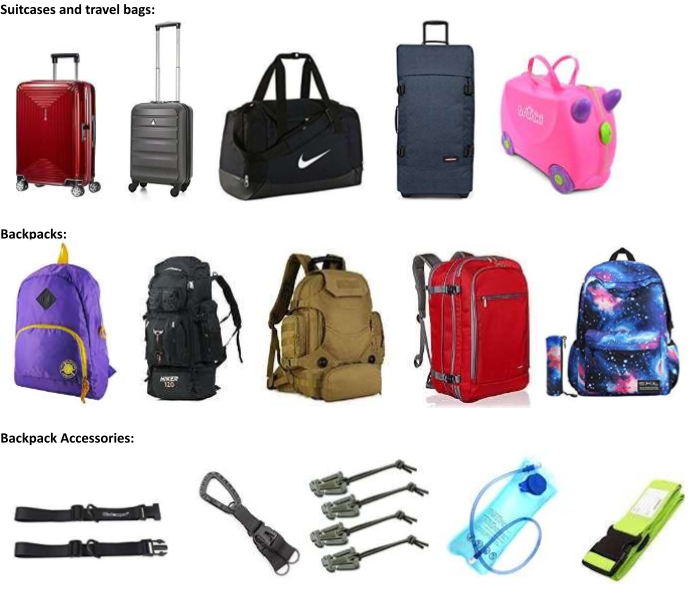

Packing organisers:
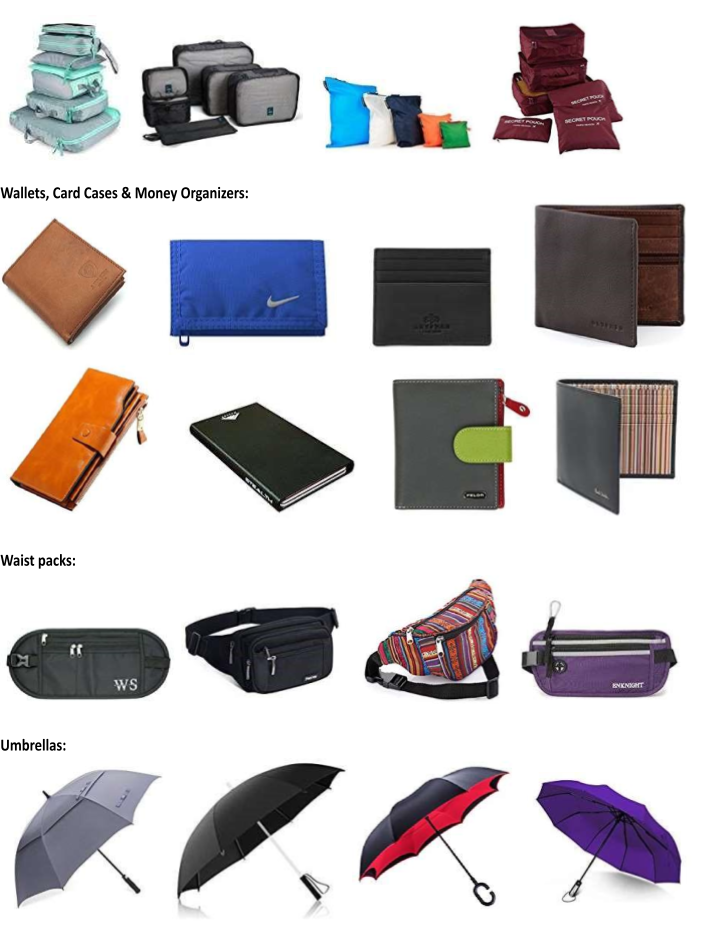
amazon Category Style Guide Luggage and Travel Accessories Summary – amazon Category Style Guide Luggage and Travel Accessories Summary –
[xyz-ips snippet=”download-snippet”]

